
פרופ' (אמריטוס) אלדעה ויצמן
קורות חיים
השכלה, פעילוות אקדמית, מענקי מחקר, הנחיית תלמידים מתקדמים: ראו
http://translation.biu.ac.il/en/elda-weizman
מחקר
מחקר בתהליך: אירוניה בתגוביות ובמאמרי עמדה בעיתונות המקוונת: בחינה משווה מבוססת-קורפוס של דפוסי אירוניה תלויי תרבות.
אתגור בריאיון החדשותי ובשיח הציבורי
חקר התרגום בגישה פרגמטית
הרצף חידוש/נתון בפרוזודיה ובספרות.
פניות: דפוסים תלויי תרבות של ההבחנה tu/vous
קורסים
תרגום ופרגמטיקה (שיעור)
עקיפות בשיח: השוואה בין תרבויות והשלכות לתרגום
לשון וכוח: השוואה בין תרבויות והשלכות לתרגום
עקיפות ונימוס: השוואה בין תרבויות והשלכות לתרגום
אירוניה והומור: השוואה בין תרבויות והשלכות לתרגום
פירסומים
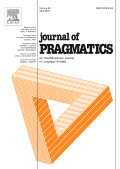
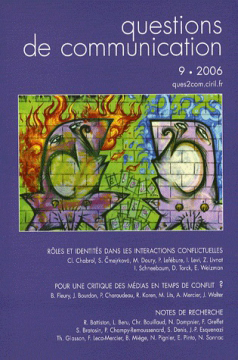
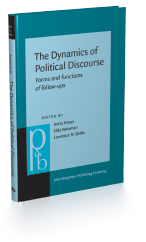
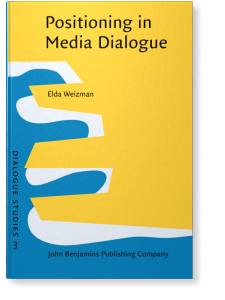
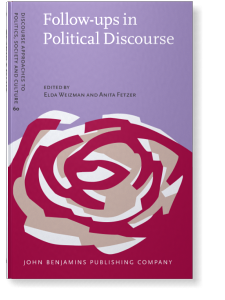
Elda Weizman
https://orcid.org/0000-0001-9068-9945
Book
Weizman, Elda, 2008. Positioning in Media Dialogue: The Case of News Interviews on Israeli Television, Amsterdam/Phildaelphia John Benjamins. https://doi.org/10.1075/ds.3
Books (editing)
Weizman, Elda and Anita Fetzer (eds.), 2015. Follow-Ups in Political Discourse: Explorations Across Contexts and Discourse Domains. Amsterdam/Philadelphia: Benjamins. https://doi.org/10.1075/dapsac.60
Fetzer, Anita, Elda Weizman and Lawrence Berlin (eds.), 2015. The Dynamics of Political Discourse: Forms and Functions of Follow-Ups. Amsterdam/Philadelphia: Benjamins. https://doi.org/10.1075/pbns.259
Fetzer, Anita and Elda Weizman (eds.), 2019. The Construction of Ordinariness in Media Genres. Amsterdam: Benjamins. https://doi.org/10.1075/pbns.307
Special issues in refereed journals (editing)
Blum Kulka, Shoshana and Elda Weizman (eds.), 2002. Children Talk: Discourse Literacy in Colloquial Language, SCRIPT 3-4 (special issue, in Hebrew).
Fetzer, Anita and Elda Weizman (eds.), 2006. Pragmatic Aspects of Political Discourse in the Media, Journal of Pragmatics 38 (2) (special issue).
https://www.sciencedirect.com/journal/journal-of-pragmatics/vol/38/issue/2
Weizman, Elda (ed.), 2006. Rôles et Identités dans le Discours Conflictuel. Questions de Communication 9, pp. 7-150 (dossier coordonné et commenté par E. Weizman).
https://journals.openedition.org/questionsdecommunication/7917
Weizman, Elda and Zohar Livnat (eds.), 2009. Perspectives in the Study of Spoken Hebrew. Hebrew Linguistics 62-63 (special issue, in Hebrew).
Weizman, Elda and Anita Fetzer (eds.), 2011. The Discourse of Redundancy. Language Sciences 33 (2) (special issue).
https://www.sciencedirect.com/journal/language-sciences/vol/33/issue/2
Fetzer, Anita, Elda Weizman and Elizabeth Reber (eds.), 2012. Follow-ups Across Discourse domains: a cross-cultural exploration of their forms and functions. Proceedings of an ESF strategic workshop, Wuerzburg, 30.5-2.6 2012. http://opus.bibliothek.uni-wuerzburg.de/volltexte/2012/7165/
Weizman, Elda and Zohar Livnat. 2022. Dialogicity in Political Discourse. Pragmatics and Society 13(5).
https://www.jbe-platform.com/content/journals/18789722/13/5
Karas, Hila, Ayelet Kohn and Elda Weizman, 2024. Translation in a Social Context. Israel Studies in Language and Society (safa vexevra) 18. (in Hebrew).
Refereed papers and chapters
Weizman, Elda, 1980. Comparative Hebrew-French grammar. Orchot 11, 44-70. (in Hebrew)
Weizman, Elda, 1982. Information processing in journalistic language. In: Blum- Kulka, S., Y. Tobin and R. Nir (eds.), Studies in Discourse Analysis. Jerusalem: Academon, 117-146. (in Hebrew)
Weizman, Elda, 1984. Some register characteristics of discourse structure in journalistic language. Applied Linguistics V/1, 39-50.
Weizman, Elda, 1984. Identifying implied referents: Textual and pragmatic factors in information processing. Applied Linguistics V/3, 264-274.
Weizman, Elda, 1985. Towards an analysis of opaque utterances: Hints as a request strategy. Theoretical Linguistics 12, No. 2/3, 153-163. https://doi.org/10.1515/thli.1985.12.2-3.153
Weizman, Elda, 1986. An interlingual study of discourse structures: Implications for the theory of translation. In: House, J. and S. Blum-Kulka (eds.), Interlingual and Intercultural Communication: Discourse and Cognition in Translation, Tubingen: Gunter Narr, 115-126.
Weizman, Elda and S. Blum-Kulka, 1987. Identifying and interpreting translated texts: On the role of pragmatic adjustment. Indian Journal of Applied Linguistics XIII, No. 2, 61-74.
Dascal, Marclo and Elda Weizman, 1987. Contextual exploitation of interpretation clues in text understanding: An integrated approach. In: Verschueren, M.J. and M. Bertuccelli- Papi (eds.), The Pragmatic Perspective, Amsterdam: John Benjamins, 31-46.
Blum-Kulka, Shoshana and Elda Weizman, 1988. The inevitability of misunderstanding. Text 8 (3), 219-241. https://doi.org/10.1515/text.1.1988.8.3.219
Weizman, Elda, 1989. Requestive hints. In: Blum-Kulka, S., J. House and G. Kasper (eds.), Cross-Cultural Pragmatics: Requests and Apologies, New Jersey: Ablex, 71-95.
Dascal, Marcelo and E.lda Weizman, 1990. Speaker’s meaning in literary texts. Hebrew Linguistics 28-30, 9-19. (in Hebrew)
Weizman, Elda and Marcelo Dascal, 1991. On clues and cues: Strategies of text understanding. Journal of Literary Semantics, XX/1, 18-30.
https://doi.org/10.1515/jlse.1991.20.1.18
Weizman, Elda, and Shoshana Blum- Kulka, 1992. Ordinary misundersanding. In: Stamenov, M. (ed.), Current Advances in Semantic Theory, Amsterdam: John Benjamins, 419-434. https://doi.org/10.1075/cilt.73.34wei
Weizman, Elda, 1993. Interlanguage requestive hints. In: Blum- Kulka, S. & G. Kasper (eds.), Interlanguage Pragmatics, Oxford: Oxford University Press, 123-137.
Weizman, Elda, 1996. Shifting roles: A challenge strategy in news interviews on Israeli television. In: Schwarzwald, O. and Y. Shlesinger (eds.), Hadassa Kantor Jubilee Book, Ramat Gan: Language Research Papers, 85-95. (in Hebrew)
Weizman, Elda, 1997. Journalistic discourse in modern Hebrew: Saturated
environments. In: Bentolila, Y. (ed.), Shay la’Hadassa: Research in the Hebrew Language and in Judaic Languages, Beer Sheva: Ben Gurion University, 211-227. (in Hebrew)
Weizman, Elda, 1998. True or false? Direct speech in the daily press. Hebrew Linguistics 43, Mars 1998, 29-42. (in Hebrew)
Weizman, Elda, 1998. Individual intentions and collective purpose: The case of news interviews. In: Cmejrkova,S., J. Hoffmanova, O. Mullerova and J. Svetla (eds.) Dialogue Analysis VI, Tubingen: Max Niemeyer Verlag, 269-280.
Kozminsky, Ely, Elda Weizman and Hana Horowitz, 1998. Teaching translation in Israeli high schools. Meta 43:1, 119-129. https://doi.org/10.7202/003349ar
Weizman, Elda, 1999. Buildng true understanding via apparent miscommunication. Journal of Pragmatics 31, 837-846. https://doi.org/10.1016/S0378-2166(96)00057-4
Weizman, Elda, 1999. Discourse patterns in news interviews on Israeli television. In: Toury, G. and R. Ben Shachar (eds.), Hebrew: A Living Language 2, Haifa: Haifa University, 135-156. (in Hebrew)
Weizman, Elda, 2000. Irony in news discourse. In: Rodrigue-Schwarzwald, O., S. Blum-Kulka and E. Olshtain (eds.), Raphael Nir jubilee Book: Studies in Communication, Linguistics and Language Teaching, Jerusalem: Carmel. 237-248. (in Hebrew)
Weizman, Elda, 2000. A Pragmatic study of the given-new discourse structure in Aharon Meged’s Novel Haxay AL Hamet. Helkat Lashon: Studies in Theoretical and Applied Lingustics 29-32, 19-39. (in Hebrew)
Weizman, Elda, 2001. Addresser, addressee and target: Negotiating roles through ironic criticism. In: Weigand, E. and M. Dascal (eds.), Negotiation and Power in Dialogic Interaction, Amsterdam: Benjamins, 125-137. https://doi.org/10.1075/cilt.214.11wei
Weizman, Elda, 2002. Interpretative support: On the role of co-text in the interpretation of indirectness. Hebrew linguistics 50-51, 37-49. (in Hebrew)
Weizman, Elda, 2003. News interviews on Israeli television: Normative expectations and discourse norms. In: Stati, S. and M. Bondi (eds.), Dialogue Analysis 2000, Tübingen: Niemeyer, 383-394. https://doi.org/10.1515/9783110933253.383
Blum Kulka, Shoshana. and Elda Weizman., 2003. Misunderstanding in political interviews. In: House, J., G. Kasper and S. Ross (eds.), Misunderstanding in Social Life. Discourse Approaches to Problematic Talk, London: Pearson, 107-128.
Weizman, Elda, 2003. What was Hirschl dreaming about? A pragmatic study of a single conversation from Agnon’s Sipur Pashut in Hebrew and its English translation. In: Halevy, Y. and D. Sivan (eds.), Yaakov Bentolila Jubillee Volume, Beer Sheva: Ben Gurion University Press, 177-190. (in Hebrew)
Weizman, Elda, 2004. A Pragmatic study of N. Sarraute’s Pour un oui ou pour un non. In: Naaman-Zauderer, N. et al. (eds), Sig Vasiach: A Multi-faceted Philosophy, Tel Aviv: Mifalim Universitayim, 183-201. (in Hebrew)
Levy, Irit, Elda Weizman and Isaac Schneeibaum. 2004. Cultural variation in interviewing styles: News interviews in Hebrew and Arabic. In: Shlesinger, Y. and M. Muschnik (eds.), Studies in Modern Hebrew, Jeruslaem: Tzivonim, 152-167. (in Hebrew)
Weizman, Elda, 2004. Interpreting emotions in literary dialogue. In: Weigand, E. (ed.), Emotion in Dialogic Interaction, Amsterdam/Philadelphia: John Benjamins, 241-254. https://doi.org/10.1075/cilt.248.16wei
Weizman, Elda and Nitsa Shelef, 2004. Le Champ sémantique de la vieillesse en Hébreu. In: Montandon, Alain (ed.), Les Mots du Vieillir, Presses Universitaires Blaise Pascal, Centre de Recherches sur les Littératures Modernes et Contemporains, 55-67.
Weizman, E. 2005. Allusions and quotations as translation problems. In: Frank, Armin Paul, N. Greiner, T. Hermans, H. Kittel, W. Koller, J. Lambert and F. Paul (eds). An International Encyclopedia of Translation Studies, Berlin/New York: Walter de Gruyter, Volume 1, 587-592. https://doi.org/10.1515/9783110137088.1.6.587
Hirsch, Galia and Elda Weizman, 2005. On the Interpretation of irony and its translation: Catch 22 by Joseph Heller as a case in point. In: Livnat, Z. and T. Wolf-Monzon (eds.), Criticism and Interpretation 38, 197-218. (in Hebrew)
Weizman, Elda and Marcelo Dascal, 2005. Interpreting speaker’s meaning in literary dialogue. In: Betten, A. and M. Dannerer, (eds.), Dialogue Analysis IX. Dialogue in Literature and the Media. Selected Papers from the 9th IADA Conference, Salzburg 2003 – Part I: Literature, Tübingen: Niemeyer, 61-72 https://doi.org/10.1515/9783110946062.61
Weizman, Elda, 2006. Roles and identities in news interviews: The Israeli context. Journal of Pragmatics 38, 154-179. https://doi.org/10.1016/j.pragma.2005.06.018
Fetzer, Anita and Elda Weizman, 2006. Political discourse as mediated and public discourse. Journal of Pragmatics 38, 143-153. https://doi.org/10.1016/j.pragma.2005.06.014
Shlesinger, Miriam, Elda Weizman and Francine Kaufmann, 2006. The Department of Translation and Interpreting Studies: From professional training to an academic discipline. In: Schwartz, D. (ed.), Bar-Ilan University: From Concept to Enterprise. Vol. 1: Milestones and History of Departments, Ramat Gan: Bar Ilan University Press, 449-462. (in Hebrew)
Weizman, Elda, 2006. Positionnement par le défi: Les Négociations des rôles dans l’interview télévisée. Questions de Communication 9, 135-149. https://doi.org/10.4000/questionsdecommunication.7926
Weizman, Elda, 2006. Roles et identitiés dans les interactions conflictuelles. Questions de Communication 9, 7-13.
French: https://doi.org/10.4000/questionsdecommunication.7919
English: https://doi.org/10.4000/questionsdecommunication.8864
Levi, Irit, Elda Weizman et Isaac Schneebaum, 2006. Soutien et défi: une pour une étude comparée des interviews télévisées sur Al-Jazira et à la télévision israélienne. Questions de Communication 9, 73-94. https://doi.org/10.4000/questionsdecommunication.7923
Weizman, Elda, Irit Levi and Isaac Schneebaum, 2007. Variation in interviewing styles: Challenge and support in Al-Jazeera and on Israeli television. In: Fetzer, A. and G. Lauerbach (eds.), Political Discourse in the Media, Amsterdam/Philadelphia: Benjamins, 197-223. https://doi.org/10.1075/pbns.160.11wei
Weizman, Elda, 2007. Quantity scales: Towards culture-specific profiles of discourse norms. In: Grein, M. and E. Weigand (eds.), Dialogue and Culture, Amsterdam/Philadelphia: Benjamins, 141-152. https://doi.org/10.1075/ds.1.10wei
Weizman, Elda, 2009. ‘Friend and enemy’: A complex network of positioning strategies. Balshanut Ivrit (Hebrew Linguistics) 62-63, 299-322. (in Hebrew)
French translation: Weizman, E. 2014. « Ami et ennemi, frère et déserteur »: une grille de positionnements complexes. Argumentation et Analyse du Discours, 12. https://doi.org/10.4000/aad.1712
Kozminsky, Lea and Elda Weizman, 2009. Towards an examination of self advocacy discourse patterns in context.Israel Studies in Language and Society 2 (2) (on-line journal). (in Hebrew)
Weizman, Elda, 2010. Voids revisited: An issue in translation studies and its implications for the study of the Hebrew language. In: Ben Shachar, R., G. Toury and N. Ben-Ari (eds.), Ha’ivrit Safa Xaya (Hebrew: A Living Language) 5, Tel-Aviv: Hakibbuts Hameuchad and the Porter Institute, Tel-Aviv University, 201-217. (in Hebrew)
Weizman, Elda, 2011. Conveying indirect reservations through discursive redundancy. Language Sciences 33, 295-304. https://doi.org/10.1016/j.langsci.2010.10.006
Weizman, Elda, 2011-2012. Positioning in context: A scale of directness. Xelkat Lashon 43-44, 331-345. (in Hebrew)
Weizman, Elda, 2012. Towards a pragmatic reading of Bible interpretation. In: Hamo. M., M. Blondheim and T. Liebes (eds.), Communication as Discourse: Studies in Language and Media, Jerusalem: Magness, 56-75. (in Hebrew)
Weizman, Elda, 2012. Negotiating irony through follow-ups: Readers' comments on op-eds in the daily press. In: Fetzer, A., E. Weizman and E. Reber (eds.), Follow-ups across discourse domains: a cross-cultural exploration of their forms and functions, Proceedings of an ESF strategic workshop, Wuerzburg, 30.5-2.6 2012. http://opus.bibliothek.uni-wuerzburg.de/volltexte/2012/7165/, 263-274.
Weizman, Elda, 2012. Irony in news interviews: Dialogism and intertexuality. Slovo a Slovesnost, special issue: Intertexuality, Polyphony, Heteroglossia. Svetla Cmejrková & Jana Hoffmannová (eds.), 253-262.
Weizman, Elda and Lea Kozminsky, 2012. Dialogic dimensions of self-advocacy in unequal power relations: Students with reading disabilities as a case in point. In: Cantarini, Sibilla (ed.), Dialogue: State of the Art. Studies in memory of Sorin Stati, series LINCOM: Studies in Pragmatics 22, München: LINCOM EUROPA, 204-217.
Weizman, Elda, 2012. A pragmatic exploration of text-based given/new relations. In: Muchnik, Malcah and Tsvi Sadan (eds.), Studies in Modern Hebrew and Jewish Languages Presented to Ora (Rodrigue) Schwarzwald, Jerusalem: Carmel, 245-258. (in Hebrew)
Weizman, Elda, 2013. Political irony: Constructing reciprocal positioning in the news interview. In: Fetzer, A. (ed.), The Pragmatics of Political Discourse: Explorations across Cultures, Amsterdam: Benjamins, 167-190. https://doi.org/10.1075/pbns.228.09wei
Weizman, Elda, 2013. News interviews. Encyclopedia of Hebrew Language and Linguistics. Leiden: Brill, vol II, 825-828.
Weizman, Elda, 2015. Irony in and through follow-ups: talk and meta-talk in online commenting. In: Fetzer, Anita, Elda Weizman and Lawrence Berlin (eds.), The Dynamics of Political Discourse, Amsterdam/Philadelphia: Benjamins. 173-194. https://doi.org/10.1075/pbns.259.07wei
Berlin, Lawrence, Elda Weizman and Anita Fetzer, 2015. Introduction. In: Fetzer, Anita, Elda Weizman and Lawrence Berlin (eds.), The Dynamics of Political Discourse, Amsterdam/Philadelphia: Benjamins. 1-14. https://doi.org/10.1075/pbns.259.001int
Fetzer, Anita and Elda Weizman, 2015. Following up across contexts and discourse domains. In: Weizman, Elda and Anita Fetzer (eds.), Follow-Ups in Political Discourse: Explorations Across Contexts and Discourse Domains. Amsterdam/Philadelphia: Benjamins. IX-XIX. https://doi.org/10.1075/dapsac.60.001int
Yatsiv-Malibert, Ilil and Elda Weizman, 2016. Prosodic features of the given/ new continuum in spoken Hebrew. Te’uda XXVII: Studies in Spoken Hebrew, ed. Einat Gonen, Tel-Aviv University, 437-452. (in Hebrew)
Yatsiv-Malibert, Ilil and Elda Weizman, 2016. Exploring the prosodic and pragmatic interface of the given/new continuum: alternating repetitions as case in point. In: Ben Shahar, R. and N.Ben Ari (eds.), Ha’ivrit Safa Xaya (Hebrew: A Living Language) 7, Tel-Aviv: Hakibbuts Hameuchad and the Porter Institute, Tel-Aviv University, 177-201. (in Hebrew)
Weizman, Elda, 2016. Ironic commenting on op-eds: obstructing discussion. Israel Studies in Language and Society, 9(1-2), 184-208. (in Hebrew)
Weizman, Elda and Gonen Dori-Hacohen, 2017. Commenting on opinion editorials in on-line journals: A cross-cultural examination of face-work in the Washington Post (USA) and NRG (ISRAEL). Discourse, Context & Media 19, 39-48. http://dx.doi.org/10.1016/j.dcm.2017.02.001
Glick (Ben-David), Mor and Elda Weizman, 2017. Translating impairment-specific / disability dependent discourse patterns: The translation of Mark Haddon’s The Curious Incident of the Dog in the Night-Time into Hebrew. Ha’ivrit 63: 3-4, 106-117 (in Hebrew)
Weizman, Elda Lea Kozminsky and Tzipy Hornik-Lurie, 2017. Students speak up for themselves: On the interrelations between self-advocacy and contextual dimensions. Helkat Lashon 50 , 117-138 (in Hebrew).
Fetzer, Anita and Elda Weizman, 2018. ‘What I would say to John and everyone like John is ...’: The construction of ordinariness through quotations in mediated political discourse. Discourse and Society 29 (5), 495-513
https://doi.org/10.1177/0957926518770259
Weizman, E. and A. Fetzer. 2018. Constructing ordinariness in online journals: a corpus-based study in the Israeli context. Israel Studies in Language and Society 11(1), 23-48.
Weizman, Elda, 2018. Commenting on in-memoriam columns: Juggling with deliberative and epidictic norms. Internet Pragmatics 1 (1), 161-183.
https://doi.org/10.1075/ip.00008.wei
Weizman, Elda and Marjut Johansson, 2019. Constructing ordinariness in online commenting in Hebrew and Finnish. In: Fetzer, Anita and Elda Weizman (eds.), The Construction of ordinariness in Media Genres. Amsterdam: Benjamins, 209-236. https://doi.org/10.1075/pbns.307.09wei
Weizman, Elda and Anita Fetzer, 2019. Introduction. In: Fetzer, Anita and Elda Weizman (eds.), The Construction of ordinariness in Media Genres. Amsterdam: Benjamins, 1-17. https://doi.org/10.1075/pbns.307.01wei
Weizman, Elda, 2020. The discursive pattern ‘claim+ indirect quotation in quotation marks’: Strategic uses in French and Hebrew online journalism. Journal of Pragmatics 157, 131-141. https://doi.org/10.1016/j.pragma.2019.07.012
Weizman, Elda, 2020. Review of: R. Weissbrod & A. Kohn. 2019. Translating the Visual: A Multimodal Perspective. New York and London: Routledge. Israel Studies in Language and Society 13 (1) (safa vexevra)
Weizman, Elda and Anita Fetzer. 2021. The discursive construction of accountability for communicative action to citizens: A contrastive analysis across Israeli and British media discourse. Intercultural Pragmatics18(5): 605-632
https://doi.org/10.1515/ip-2021-5002
Weizman, Elda. 2022. Interviewing Styles: Reciprocal Positioning and Power in the Israeli Context. In: Feldman, Ofer. (ed), Adversarial Political Interviewing. The Language of Politics. Springer, Singapore. 63-84. https://doi.org/10.1007/978-981-19-0576-6_4
Weizman, Elda 2022. Explicitating irony in a cross-cultural perspective: Discursive practices in online op-eds. in French and in Hebrew. Contrastive Pragmatics.
https://doi.org/10.1163/26660393-bja10063
Weizman, Elda and Ayelet Kohn,. 2022. Resemblance in comments/posts interaction: Dialogcitiy and functions. Pragmatics and Society 13(5), 864-887. https://doi.org/10.1075/ps.21022.wei
Weizman, Elda and Zohar Livnat, 2022. Dialogic meaning-making in political settings. Pragmatics and Society 13(5), 731-746. https://doi.org/10.1075/ps.21026.int
Weizman, Elda. 2023. Recontextualization practices: A scale of directness. Frontiers in Communication, 7. https://doi.org/10.3389/fcomm.2022.1062585
Weizman, Elda, 2024. Conveying irony through minimally contextualized quotation marks and their textual environments. Wiener Linguistische Gazette 97, 135–153.
Kohn, Ayelet and Elda Weizman, in press, Enhancing the Debate through Quotations: The Political Arena in Israel. In: Feldman, Ofer (ed.), Not My Words: How and Why Elected Officials Quote, Requote, and Misquote Others. Springer, Singapore.
Fetzer, Anita and Elda Weizman, in press. Corpus Linguistics and Political Discourse. International Encyclopedia of Language and Linguistics, 3rd Edition.
Hen, Tal and Eda Weizman, 2024. Positioning and Facework in a Social Context – The Runaway Jury by John Grisham: Source Text and Its Translation as a Case in Point. Israel Studies in Language and Society (safa vexevra) 18, 122-144. (in Hebrew)
Weizman, E. review of: Livnat, Z., Not so Funny: Verbal Irony as a Discourse Practice. Israel Studies in Language and Society (safa vexevra) 18, 231-238.
Weizman, E., A. Shmidman & A. Gerczuk, under review. Detecting verbal irony: A pragmatic-based approach to neural-network training.
מידע נוסף
אלדעה ויצמן היא פרופ' אמריטה במחלקה לתרגום בבר-אילן, שם היא מלמדת פרגמטיקה משווה בין תרבויות וסוגיות בחקר התרגום בגישה פרגמטית. בנוסף, היא מכהנת כראשת היחידה ללימודים בין-תחומיים באוניברסיטה. היא חוקרת בתחום חקר השיח המשווה (עברית-אנגלית-צרפתית) בגישה סוציו-פרגמטית, ומתמקדת בחקר העקיפות (אירוניה, אתגור) והמיצוב בשיח. בנושאים אלה ערכה בשיתוף גליונות מיוחדים בכתבי עת באנגלית, בצרפתית ובעברית, ופרסמה, בין היתר, ב- Journal of Pragmatics, Language Sciences, Argumentation et Analyse du Discours, Questios de Communication, , בלשנות עברית, שפה וחברה וחלקת לשון. ספרה Positioning in media Dialogue: Negotiating roles in the new interview, המבוסס על מחקר בתמיכת האקדמיה הישראלית למדעים, יצא לאור ב 2008 בהוצאת ג'ון בנג'מינס. פרופ' ויצמן אף ניהלה מחקר משותף עם פרופ' לאה קוזמינסקי בנושא "סנגור עצמי אצל סטודנטים בעלי לקויות קריאה", בתמיכת האקדמיה הישראלית למדעים. לאחרונה יצאו לאור שני ספרים בעריכתה (בשיתוף עם פרופ' אניטה פטזר) בהוצאת John Benjamins. הספרים מסכמים מחקר שנעשה בשיתוף חוקרים באירופה ובתמיכת הקרן האירופית למדעים, ועניינו ניתוח פרגמטי-לשוני של השיח הפוליטי–תקשורתי בהקשרים שונים (ישיבות פרלמנט, ראיונות, דיונים, נאומים, מאמרי מערכת, טוקבקים, פורומים אינטרנטיים וטוויטר). כיום היא מנהלת מחקר מבוסס קורפוס משווה בנושא השימוש באירוניה בעיתונות הכתובה, הנשען על קורפוס מקוון של מאמרי דעה ותגוביות בעברית ובצרפתית.
תחומי עניין
פרגמטיקה משווה בין-תרבותית
אירוניה
מחקרי קורפוס
שיח התקשורת והפוליטיקה
ראיונות חדשותיים
דפוסים תלויי תרבות של ההבחנה tu/vous
פרגמטיקה משווה והשלכות לתרגום
דפוסי שיח בספרות והשלכות לתרגום
סנגור עצמי
תאריך עדכון אחרון : 24/11/2024



